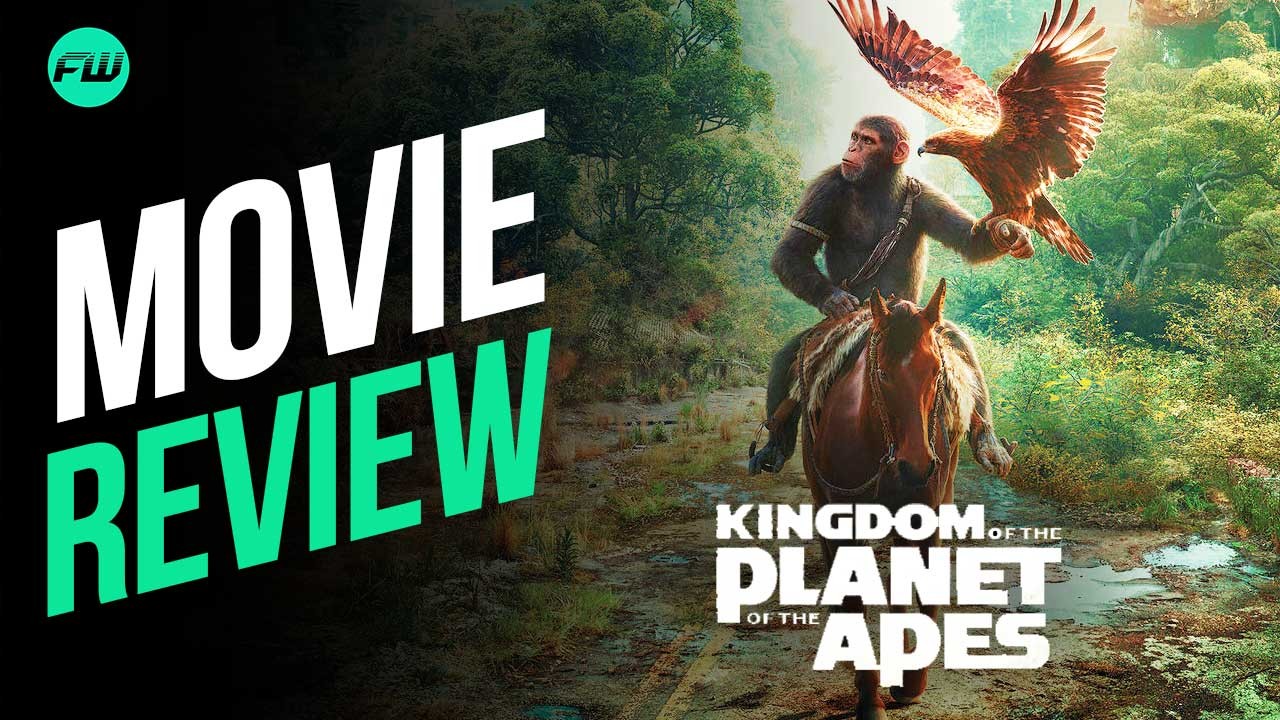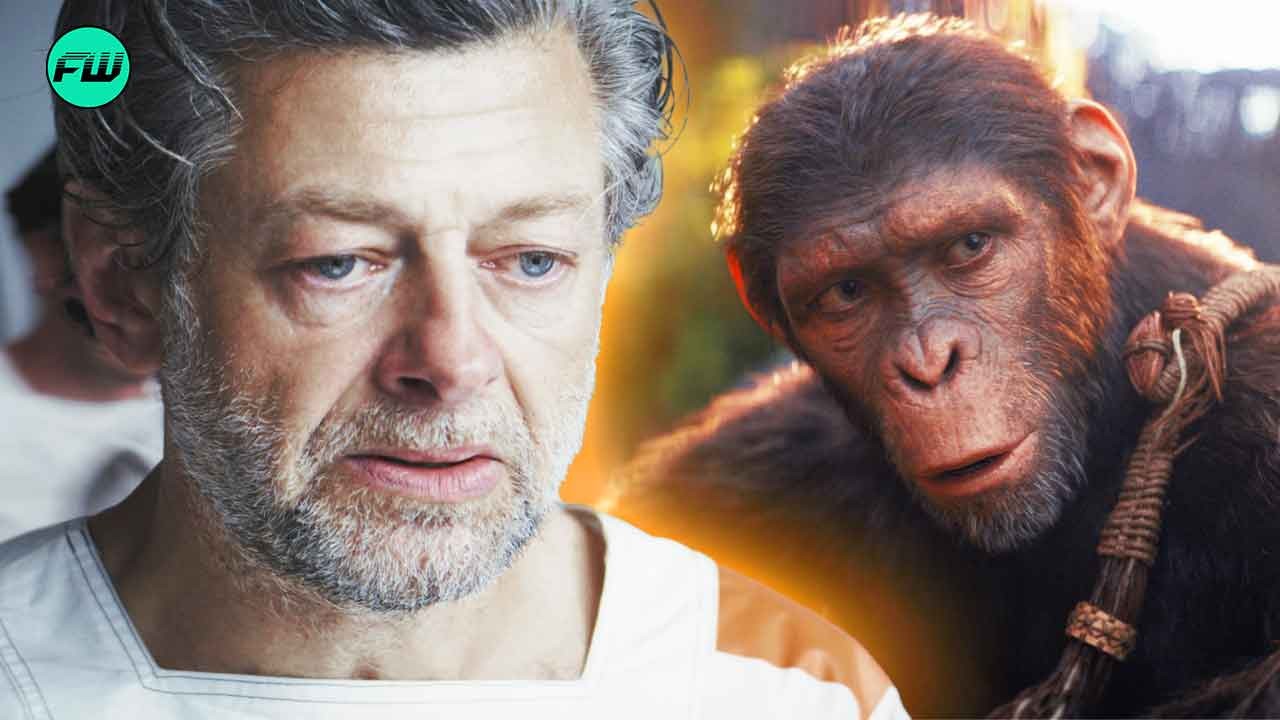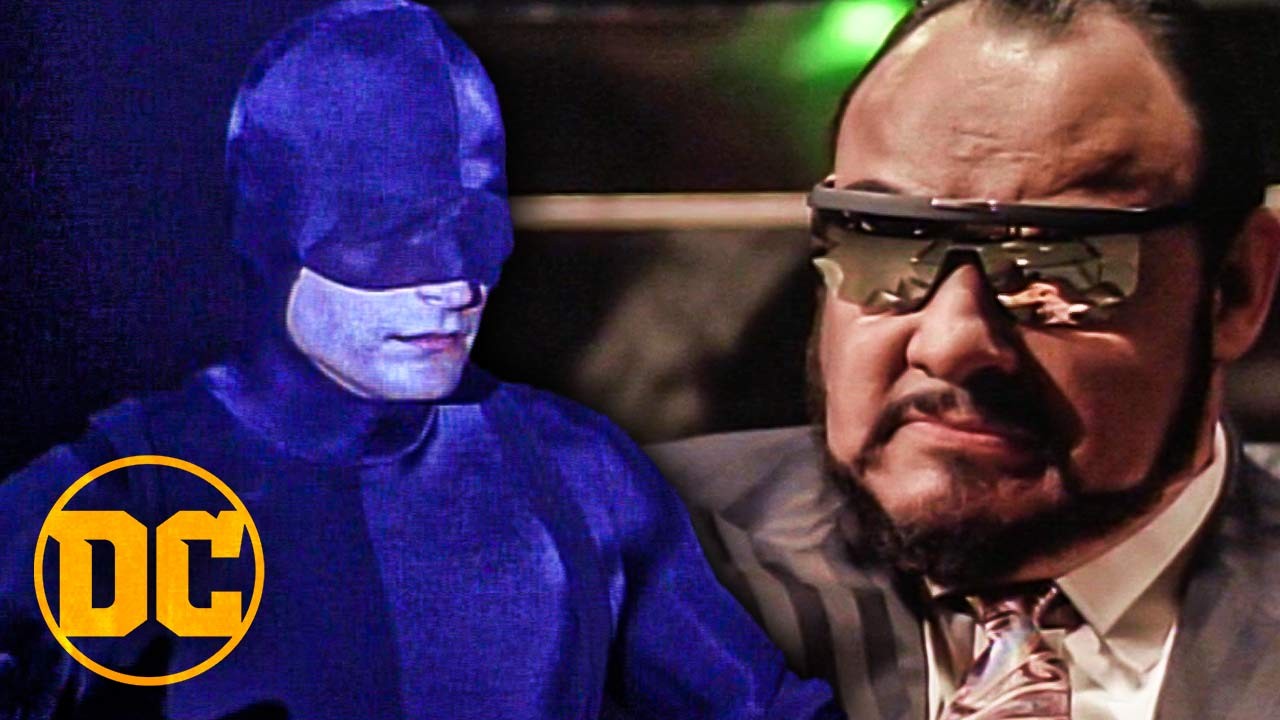Kingdom of the Planet of the Apes releases in theatres on May 10th, 2024.
The reboot from the past decade of the massive Planet of the Apes franchise is often mentioned in debates about the best trilogies of the century, and personally, I couldn’t agree more. Although Rupert Wyatt’s Rise of the Planet of the Apes doesn’t quite reach the same level as Matt Reeves’ Dawn and War (The Batman), the trilogy’s overarching story has the ideal narrative, thematic, and entertainment ingredients for an undeniable success, alongside the truly impressive use of motion-capture technology.
With Wes Ball (The Maze Runner) at the helm and a script by Josh Friedman (War of the Worlds), expectations couldn’t be higher for one of the most anticipated films of the year, Kingdom of the Planet of the Apes.
Several generations after Caesar’s reign, apes have become the dominant species, living harmoniously, while humans have been reduced to living in the shadows. As a new tyrannical leader builds his empire, a young ape embarks on a journey that will lead him to question the teachings he has received about the past and make decisions that will define the future of both apes and humans. This is the official synopsis of Kingdom of the Planet of the Apes, and I keep it unchanged because I want all readers to experience the movie in the theater without any minor spoilers.
Kingdom of the Planet of the Apes Critique
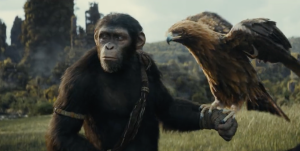
The month of May brings us two films connected to award-winning movies overwhelmingly loved by a vast majority of critics and the general audience: Furiosa, as a prequel/spin-off to one of the best action blockbusters in the history of the genre, Max Max: Fury Road; and Kingdom of the Planet of the Apes, as a distant sequel to the last – and my favorite – installment of the previous trilogy. Inevitably, both critics and viewers will fall either into the trap of expecting something exactly equal to or superior to films that may well be their all-time favorites, or into the opposite deception, entering with a predetermined negative mindset, not liking anything on the big screen for reasons often external to the movie itself.
Personally, as someone who had the luck of entering the IMAX theater without any visual, auditory, or narrative prior knowledge, Kingdom of the Planet of the Apes is, above all, interesting. Knowing that the cinephile community lives – in a rather unhealthy manner – on constant comparisons, I will quickly assert that Dawn and War remain on a different level. That said, Ball delivers a film with a clear vision, full of thought-provoking themes, important symbolism, and truly incredible technical aspects.
Caesar’s legacy had such an impact on the evolution of his species that it turned him into a biblical figure. Naturally, over the years following his Era, his words, ideals, and morals are distorted and give rise to different interpretations of his leadership. While some try to follow his “laws,” others try to take advantage of them for their own interests. The cycle of life and the known theories of nature’s evolution fit into the message that “history repeats itself,” and Kingdom of the Planet of the Apes makes that clear through the almost inevitable connection between religion and war.
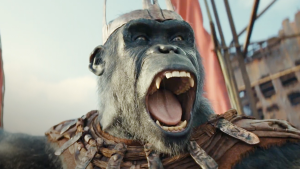
Owen Teague (Bloodline) delivers an excellent performance as the young protagonist, Noa, who goes through the predictable yet captivating and well-executed hero’s journey arc. Along his path of self-discovery, he meets Raka (Peter Macon), a wise orangutan knowledgeable about Caesar’s true history. Noa accepts the lessons of “teacher” Raka and incorporates Caesar’s ideals throughout the movie, gradually becoming a more complete character and, most importantly, someone whom viewers want to see succeed in his mission.
Freya Allan (The Witcher) portrays a human character whom I’ll leave unnamed because it’s from her introduction in the story that Kingdom of the Planet of the Apes really gets going, becoming utterly fascinating due to its intelligent connections with the previous films.
From the first time an ape spoke – Caesar’s famous “NO!” – to the species’ goal of finding their own home, Ball’s parallels are the movie’s highlights, putting humans in a similar position and viewpoint to that of apes in the past. These aren’t mere callbacks but genuinely captivating plot points and revelations that greatly contribute to compelling character development.
That said, it’s in this more thematic section of Kingdom of the Planet of the Apes that I find some issues. Kevin Durand (The Strain) voices and embodies Proximus, an antagonist with a somewhat superficial motivation for someone with a completely different view from what Caesar advocated. After so many sermons – which occasionally become too heavy in exposition already familiar to the audience – about the most important ape ever, one would expect, at least, a dialogue that deepened Proximus’s likely intriguing outlook on Caesar’s life.
In Dawn, viewers understand Koba’s hatred for humans through various interactions, increasingly intense and provocative, with Caesar. It’s only after these several confrontations that Koba decides to take matters into his own hands. In Kingdom of the Planet of the Apes, Friedman’s screenplay only develops this more philosophical component in Noa’s arc, ultimately leaving Proximus as a forgettable villain, despite Durand’s decent performance.
![Kingdom of the Planet of the Apes [Credit: 20th Century Studios]](https://fwmedia.fandomwire.com/wp-content/uploads/2024/05/05110922/Kingdom-of-the-Planet-of-the-Apes-Credit-20th-Century-Studios-300x168.jpeg)
A similar problem occurs with Allan’s character. The actress demonstrates all her innate talent which has made her one of the most popular young actresses working today, achieving extraordinary expressiveness and a commendable physical performance. Unfortunately, some character decisions seem confusing and contradictory to what she communicates through gestures and speech. Her last dialogue in Kingdom of the Planet of the Apes left a rather bitter taste that I hope will improve with time and future installments – assuming the character will return.
Turning to technical aspects, it’s hard not to emphasize the impressively astonishing quality of the motion-capture work once again. Kingdom of the Planet of the Apes visually distinguishes itself from the previous flicks, using Gyula Pados’s gorgeous cinematography (The Maze Runner) to showcase the already stunning landscapes of this new world, while maintaining those intimate close-ups among the apes.
John Paesano’s (Daredevil) score accompanies the narrative and energetic action sequences well enough but doesn’t reach the immersive, extremely emotional notes and melodies of Michael Giacchino’s themes – it’s unbelievable how much his music can transform character deaths or ravishing images into something much more compelling.
Personally, expectations were met because Kingdom of the Planet of the Apes continues Caesar’s legacy in a way that truly justifies further exploration. There are important messages to convey, complex themes to study, and a fantastic protagonist to follow. I may not have left the cinema completely in love with this new adventure, but I will definitely be in line for the premiere of the next installment.
In Conclusion
Kingdom of the Planet of the Apes is an intriguing addition to the franchise, full of fascinating parallels and a thought-provoking exploration of Caesar’s legacy, despite some lack of depth linked to the motivations of some characters. The exploration of important themes such as religion, war, and distinct perspectives on biblical figures leads to the most immersive moments of a film that takes time to find its rhythm.
With a clear vision from Wes Ball and fantastic performances, the impressive motion-capture work contributes tremendously to a visually mesmerizing experience. For fans of the saga, it’s a continuation worth following with interest, promising more moral reflections on the evolution of nature and the inevitable cycle of life.
7/10
Follow us for more entertainment coverage on Facebook, Twitter, Instagram, and YouTube.

